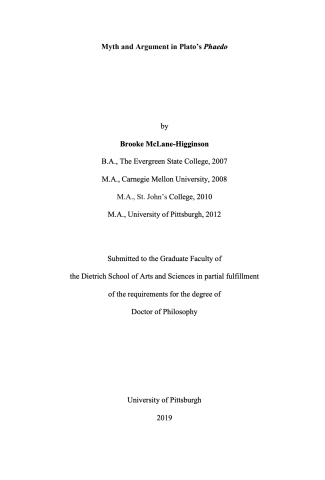
This dissertation argues for reading the myth at the end of Plato’s Phaedo as part of the overall argumentative structure of the dialogue. Using the Toulmin method of argument analysis, I analyze each of Socrates’ proofs for the immortality of the soul, as well as the myth and the argument before the proofs. These analyses show that each of Socrates’ arguments rely on the hypothesis of the Forms, and that some of them also employ the hypothesis that the soul is immortal. I then analyze the demonstrative status of each argument, by which I mean how strongly or weakly Socrates claims to have ‘proven,’ ‘shown,’ etc. the conclusion of the argument. The result of this analysis is that the arguments that do not use the hypothesis of the soul’s immortality all have a higher demonstrative status than those that do, suggesting that the hypothesis of immortality leads to somewhat less sure conclusions than the hypothesis of the Forms. I then argue that we should read the argumentative structure of the dialogue as an example of the method of hypothesis as Socrates characterizes it in Phaedo: the hypothesis of the Forms is a higher hypothesis while the hypothesis of the soul’s immortality is a lower hypothesis, and the progression of arguments in the dialogue (including the myth) first ascends from the lower hypothesis used in the preliminary argument to the higher hypothesis used in the proofs of immortality, then descends to the lower hypothesis again through the myth. Finally, I argue that the myth has both a rational persuasive function and a non-rational one. Its rational persuasive function is to show the consequences of the hypothesis of immortality, which should give us greater confidence in that hypothesis. Its non-rational persuasive function is to charm away the fear of death and draw its hearers toward a philosophical life. I conclude by identifying several structural and thematic elements of the Phaedo myth that are present also in the myths of Phaedrus and Republic, suggesting that Socrates’ eschatological myths have some structural and thematic consistency across dialogues.
